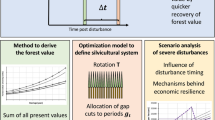Abstract
Nowadays, many countries in the world have paid attention to the issue of improving the eco-compensation program for their forest ecotourism systems aiming to successfully drive forest ecosystem protection. However, an operable eco-compensation mechanism must give a fair and balanced consideration to each involved party’s pursuits which naturally encompass benefits and responsibilities. In this study, based on the evolutionary game theory, we developed a set of mathematical models to evaluate the attitudes and preferences toward the eco-compensation programs in which the three primary stakeholders are involved including farmers, local government, and business groups in order to investigate whether the stakeholders’ asymptotic stabilization strategy can be discovered. In addition, the simulation analysis shows the sensitivity characteristics and evolution process of stakeholders influenced by multiple influencing factors. The results show that the threshold effect of these factors turns out to be an important basis in formulating sustainable development schemes for the eco-compensation program in the forest ecotourism system. Furthermore, the simulation analysis also shows that the initial state of stakeholders affects the rate of convergence to the asymptotic stability. Accordingly, we put forward the three-stage strategy and address policy implications on the operable eco-compensation program development of the forest ecotourism system.












Similar content being viewed by others
Data availability
All data generated or analyzed during this study are included in this published article.
Notes
Eco-compensation is an institutional arrangement of various rules, incentives, and coordination, as well as balancing the interest among various stakeholders in order for ensuring sustainable use of ecological system.
International Ecotourism Society defines ecotourism as, “responsible travel to natural areas (forests, grasslands, lakes, geological heritage, wetlands, etc.) which conserves the environment and improves the well-being of local people.” However, the forest ecotourism, as of a subset ecotourism, mainly depends on forest resources for recreation activities.
References
Arsić S, Nikolić D, Živković Ž (2017) Hybrid SWOT - ANP - FANP model for prioritization strategies of sustainable development of ecotourism in National Park Djerdap, Serbia. Forest Policy Econ 80:11–26
Ashok S, Tewari HR, Behera MD, Majumdar A (2017) Development of ecotourism sustainability assessment framework employing Delphi, C&I and participatory methods: a case study of KBR, West Sikkim, India. Tour Manag Perspect 21:24–41
Bosselmann AS, Lund JF (2013) Do intermediary institutions promote inclusiveness in PES programs? The case of Costa Rica. Geoforum 49:50–60
Boumaour A, Grimes S, Brigand L, Larid M (2018) Integration process and stakeholders’ interactions analysis around a protection project: case of the National park of Gouraya, Algeria (south-western Mediterranean). Ocean Coast Manag 153:215–230
Brandt JS, Buckley RC (2018) A global systematic review of empirical evidence of ecotourism impacts on forests in biodiversity hotspots. Curr Opin Environ Sustain 32:112–118
Brosche J, Legner M, Kreutz J, Ijla A (2017) Heritage under attack: motives for targeting cultural property during armed conflict. Int J Herit Stud 23:248–260
Candela G, Cellini R (2006) Investment in tourism market: a dynamic model of differentiated oligopoly. Environ Resour Econ 35:41–58
Caust J, Vecco M (2017) Is UNESCO World Heritage recognition a blessing or burden? Evidence from developing Asian countries. J Cult Herit 27:1–9
Chiabai A, Travisi CM, Markandya A, Ding H, Nunes PALD (2011) Economic assessment of forest ecosystem services losses: cost of policy inaction. Environ Resour Econ 50:405–445
Costanza R, dArge R, deGroot R, Farber S, Grasso M, Hannon B, Limburg K, Naeem S, Oneill RV, Paruelo J, Raskin RG, Sutton P, vandenBelt M (1997) The value of the world’s ecosystem services and natural capital. Nature 387:253–260
De Pourcq K, Thomas E, Arts B, Vranckx A, Leon-Sicard T, Van Damme P (2017) Understanding and resolving conflict between local communities and conservation authorities in Colombia. World Dev 93:125–135
Demir S, Esbah H, Akgun AA (2016) Quantitative SWOT analysis for prioritizing ecotourism-planning decisions in protected areas: Igneada case. Int J Sust Dev World 23:456–468
Domkea GM, Oswaltb SN, Waltersa BF, Morinc RS (2020) Tree planting has the potential to increase carbon sequestration capacity of forests in the United States. Proc Natl Acad Sci U S A 117:24649–24651
Engel S, Pagiola S, Wunder S (2008) Designing payments for environmental services in theory and practice: an overview of the issues. Ecol Econ 65:663–674
Garrido P, Elbakidze M, Angelstam P, Plieninger T, Pulido F, Moreno G (2017) Stakeholder perspectives of wood-pasture ecosystem services: a case study from Iberian dehesas. Land Use Policy 60:324–333
Graci S (2013) Collaboration and partnership development for sustainable tourism. Tour Geogr 15:25–42
Griggs D, Stafford-Smith M, Gaffney O, Rockstroem J, Oehman MC, Shyamsundar P, Steffen W, Glaser G, Kanie N, Noble I (2013) Sustainable development goals for people and planet. Nature 495:305–307
Halstead P (2018) Forest clearance and land use by early farmers in Europe: Insights from north Greek oral history. Quat Int 496:42–50
Hansen MH, Li H, Svarverud R (2018) Ecological civilization: interpreting the Chinese past, projecting the global future. Glob Environ Chang 53:195–203
Hiwasaki L (2005) Toward sustainable management of national parks in Japan: securing local community and stakeholder participation. Environ Manag 35:753–764
Hofbauer J, Sigmund K (2003) Evolutionary game dynamics. Bull Am Math Soc 40:479–519
Kijazi MH, Kant S (2010) Forest stakeholders’ value preferences in Mount Kilimanjaro, Tanzania. Forest Policy Econ 12:357–369
Kim YG (1994) Evolutionarily stable strategies in the repeated prisoners-dilemma. Math Soc Sci 28:167–197
Klapwijk MJ, Boberg J, Bergh J, Bishop K, Bjorkman C, Ellison D, Felton A, Lidskog R, Lundmark T, Keskitalo ECH, Sonesson J, Nordin A, Nordstrom EM, Stenlid J, Marald E (2018) Capturing complexity: forests, decision-making and climate change mitigation action. Glob Environ Chang Hum Policy Dimens 52:238–247
Laudati AA (2010) The encroaching forest: struggles over land and resources on the boundary of Bwindi Impenetrable National Park, Uganda. Soc Nat Resour 23:776–789
Liu S, Xu J (2019) Livelihood mushroomed: examining household level impacts of non-timber forest products (NTFPs) under new management regime in China’s state forests. Forest Policy Econ 98:44–53
Liu C, Li J, Pechacek P (2013) Current trends of ecotourism in China’s nature reserves: a review of the Chinese literature. Tour Manag Perspect 7:16–24
Liu M, Yang L, Min Q (2018) Establishment of an eco-compensation fund based on eco-services consumption. J Environ Manag 211:306–312
Loomis JJ, Knaus M, Dziedzic M (2019) Integrated quantification of forest total economic value. Land Use Policy 84:335–346
Lyapunov AM (1992) The general problem of the stability of motion. Int J Control 55:531–773
MA MEA (2005) Ecosystems and human well-being: synthesis. Island Press, Washington
Ma B, Cai Z, Zheng J, Wen Y (2019a) Conservation, ecotourism, poverty, and income inequality – a case study of nature reserves in Qinling, China. World Dev 115:236–244
Ma B, Yin R, Zheng J, Wen Y, Hou Y (2019b) Estimating the social and ecological impact of community-based ecotourism in giant panda habitats. J Environ Manag 250:109506
Maier C, Lindner T, Winkel G (2014) Stakeholders’ perceptions of participation in forest policy: a case study from Baden-Württemberg. Land Use Policy 39:166–176
Michalski F, Metzger JP, Peres CA (2010) Rural property size drives patterns of upland and riparian forest retention in a tropical deforestation frontier. Glob Environ Chang Hum Policy Dimens 20:705–712
Mitchard ETA (2018) The tropical forest carbon cycle and climate change. Nature 559:527–534
Morgan-Davies C, Waterhouse T (2010) Future of the hills of Scotland: stakeholders’ preferences for policy priorities. Land Use Policy 27:387–398
Nyaupane GP, Poudel S (2011) Linkages among biodiversity, livelihood, and tourism. Ann Tour Res 38:1344–1366
Ramos A, Jujnovsky J, Almeida-Lenero L (2018) The relevance of stakeholders’ perceptions of ecosystem services in a rural-urban watershed in Mexico City. Ecosyst Serv 34:85–95
Randle EJ, Hoye R (2016) Stakeholder perception of regulating commercial tourism in Victorian National Parks, Australia. Tour Manag 54:138–149
Raum S, Potter C (2015) Forestry paradigms and policy change: the evolution of forestry policy in Britain in relation to the ecosystem approach. Land Use Policy 49:462–470
Reimer JK, Walter P (2013) How do you know it when you see it? Community-based ecotourism in the Cardamom Mountains of southwestern Cambodia. Tour Manag 34:122–132
Robson J, Robson I (1996) From shareholders to stakeholders: critical issues for tourism marketers. Tour Manag 17:533–540
Rocha SJSSd, Comini IB, Morais Júnior VTMd, Schettini BLS, Villanova PH, Alves EBBM, Silva LB, Jacovine LAG, Torres CMME (2020) Ecological ICMS enables forest restoration in Brazil. Land Use Policy 91:104381
Roitman I, Galli Vieira LC, Baiocchi Jacobson TK, da Cunha Bustamante MM, Silva Marcondes NJ, Cury K, Estevam LS, da Costa Ribeiro RJ, Ribeiro V, Stabile MCC, de Miranda Filho RJ, Avila ML (2018) Rural Environmental Registry: an innovative model for land-use and environmental policies. Land Use Policy 76:95–102
Shang W, Gong Y, Wang Z, Stewardson MJ (2018) Eco-compensation in China: Theory, practices and suggestions for the future. J Environ Manag 210:162–170
Shasha ZT, Geng Y, Sun HP, Musakwa W, Sun L (2020) Past, current, and future perspectives on eco-tourism: a bibliometric review between 2001 and 2018. Environ Sci Pollut Res 27:23514–23528
Sheng W, Zhen L, Xie G, Xiao Y (2017) Determining eco-compensation standards based on the ecosystem services value of the mountain ecological forests in Beijing, China. Ecosyst Serv 26:422–430
Shi F, Weaver D, Zhao Y, Huang M-F, Tang C, Liu Y (2019) Toward an ecological civilization: mass comprehensive ecotourism indications among domestic visitors to a Chinese wetland protected area. Tour Manag 70:59–68
Siljander M, Kuronen T, Johansson T, Munyao MN, Pellikka PKE (2020) Primates on the farm - spatial patterns of human-wildlife conflict in forest-agricultural landscape mosaic in Taita Hills, Kenya. Appl Geogr:117
Smith JM, Price GR (1973) The logic of animal conflict. Nature 246:15–18
Taylor PD, Jonker LB (1978) Evolutionarily stable strategies and game dynamics. Math Biosci 40:145–156
Thompson BS, Friess DA (2019) Stakeholder preferences for payments for ecosystem services (PES) versus other environmental management approaches for mangrove forests. J Environ Manag 233:636–648
Vongvisouk T, Broegaard RB, Mertz O, Thongmanivong S (2016) Rush for cash crops and forest protection: neither land sparing nor land sharing. Land Use Policy 55:182–192
Wainwright J, Hsu L (1989) A dynamical-systems approach to Bianchi cosmologies - orthogonal models of class-a. Classical Quantum Gravity 6:1409–1431
Wang W, Feng L, Zheng T, Liu Y (2021) The sustainability of ecotourism stakeholders in ecologically fragile areas: implications for cleaner production. J Clean Prod 279
Wondirad A, Tolkach D, King B (2020) Stakeholder collaboration as a major factor for sustainable ecotourism development in developing countries. Tour Manag 78
Yang Z, Shi H, Yang D, Cai Y, Ren X (2015) Analysis of core stakeholder behaviour in the tourism community using economic game theory. Tour Econ 21:1169–1187
Funding
This study received financial support from the National Natural Science Foundation of China (71640035), and Humanities and Social Sciences Foundation of Liaoning Province (JW202002).
Author information
Authors and Affiliations
Contributions
Yan Bu: conceptualization, methodology, software, data curation, writing-original draft preparation, writing-reviewing and editing. Erda Wang: visualization, supervision, writing-reviewing and editing. Yang Yu: funding acquisition, validation.
Corresponding author
Ethics declarations
Ethics approval and consent to participate
Not applicable.
Consent to publish
All the authors have agreed for authorship, read and approved the manuscript, and given consent for submission and subsequent publication of the manuscript.
Competing interests
The authors declare no competing interests.
Additional information
Responsible Editor: Philippe Garrigues
Publisher’s note
Springer Nature remains neutral with regard to jurisdictional claims in published maps and institutional affiliations.
Rights and permissions
About this article
Cite this article
Bu, Y., Wang, E. & Yu, Y. Analysis on asymptotic stabilization of eco-compensation program for forest ecotourism stakeholders. Environ Sci Pollut Res 28, 29304–29320 (2021). https://doi.org/10.1007/s11356-021-12703-5
Received:
Accepted:
Published:
Issue Date:
DOI: https://doi.org/10.1007/s11356-021-12703-5




